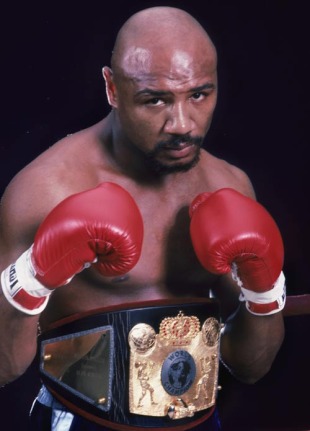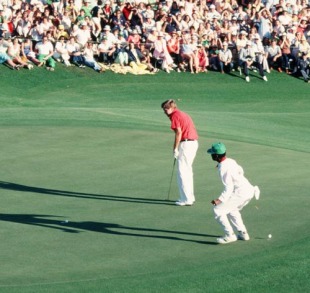- April 15 down the years
Hagler hammers Hearns

1985
One of the most eagerly awaited boxing matches of all time. Tommy Hearns was the reigning WBC light-middleweight champion when he went hunting for a world title at the next weight up. But he faced a tough ask: Marvin Hagler was a fearsome proposition who'd been champion since 1980. But Hearns seemed to have the guns to take on the juggernaut. His long arms gave him some frightening leverage, a real puncher's chance. Hagler's blows had more of cumulative effect, but that isn't what won him the fight tonight. For the first two rounds, Hearns kept on the move while finding Hagler easy to hit with hooks and crosses. But even though he hit him a lot, he didn't hurt him much. Hearns had been a world welterweight champion, and his punches didn't have the same effect against a natural middleweight as strong as Hagler. It's true that Hearns later won the light-heavyweight title, but that was against lesser opposition. Tonight he was hitting a rock, and in the third round the rock hit back, though the winning punch wasn't much to look at. As Hearns wheeled away, a long right hand caught him above the ear. It didn't look like a knockout blow, but it did strange things inside Hearns's head. Suddenly he wobbled, and another right hand put him down. He got up in time, but the legs were still unsteady and that was that. An unsatisfactory end to what was shaping into a classic.
1947
Jackie Robinson became the first black man to play Major League Baseball since the 1880s. After years in the Negro League, he was already 28 by the time he batted for the Brooklyn Dodgers against the Boston Braves. Ebbets Field stadium held 32,000, but this landmark game wasn't a sell-out. More than half the 25,623 spectators were black, and whites were similarly antagonistic towards Robinson throughout his first season. He was almost withdrawn from the game at Cincinnati when bottles and spittle joined the racist chants. He survived to win a World Series and join the Hall of Fame.
1901
Joe Davis was born in Derbyshire. The most successful snooker player of all time, he won the World Championship the first 15 times it was held, from 1927 to 1946, which would have been 20 if five Championships hadn't been cancelled by the War. There wasn't as much opposition in those days, but players like Australia's Horace Lindrum were class acts, and Davis beat him in three finals. He wouldn't have beaten today's top players (he simply didn't have the cue power), but he might just have outlasted them: in his last World final, he beat Lindrum 78 frames to 67! In the 1940 final, Davis beat his brother Fred, who succeeded him as multiple champion. Like Fred, Joe was also world billiards champion, four times in a row from 1928 to 1932 (there was no championship in 1931) as well as finishing runner-up before and after that. Joe made the first officially accepted 147 maximum on January 22, 1955. He died soon after collapsing while watching Fred play in the 1978 World Championship.
2000
The 1990s belonged to Stephen Hendry. He won all seven of his world titles in that decade. But the signs that he might not dominate the next decade arrived immediately. In the first round of the first World Championship of the new millennium, he lost 10-7 to Stuart Bingham, a former world amateur champion but now a 300-1 outsider making his Crucible debut. Hendry came from 4-2 down to lead 5-4 at the end of the first session, but missed easy chances in the next game and was soon 8-5 down. Bingham won the last frame with an 87. Hendry hasn't won the title since 1999.
1984
Ben Crenshaw won a Major at last. After ten top-ten finishes, including three second places, he handed the tag of Best Golfer Not To Win A Major to Tom Kite, who led after the third round but shot a 75 in the last after finding the water at the dreaded short 12th. Crenshaw began with a 67 and ended with a 68 full of spectacular putts, like the 20-footer to save par at the 4th and an astonishing switchback 60-foot birdie at the 10th. He finished two strokes ahead of Tom Watson to take the event's first $100,000 cheque, and recovered from a serious disease to set up a tear-jerking finale on April 9, 1995.
1979
Augusta is a shipwreck coast. The bones of golfers who threw away the Masters. One of the tormented ghosts is Ed Sneed, who led by five strokes at the start of the last round. He was still three up with three to play, but then shot three bogeys in a row. At the last, he needed to hole a six-footer for the title, but left the ball on the lip of the cup. Forced into a play-off with Tom Watson and 'Fuzzy' Zoeller, he lost it at the second hole, Zoeller won the event at the first attempt, Sneed never won a Major.

1912
The Titanic sank. Among the survivors was Dick Williams. Wearing a fur coat, he jumped from the sinking ship and found a lifeboat. When the Carpathia came to the rescue, most of the other occupants had frozen to death and doctors wanted to amputate Williams's legs to avoid gangrene. He recovered to play Davis Cup tennis for the USA the following year and win the Wimbledon doubles title in 1920.
1875
Jim Jeffries was born in Ohio. It's hard to believe he had only 11 pro fights before challenging for a world title, but that's what it says here. Boxers' records were sketchy in the 19th Century: Jeffries may well have taken part in dozens of unrecorded bouts. Anyway, here was, in 1899, taking on the great Bob Fitzsimmons for the heavyweight title. 'Heavyweight' is stretching it a bit in Fitz's case: he was a natural middleweight and went into this fight weighing less than 12 stone. Jeffries, meanwhile, was big. By the standards of the day, a great slab of a man, 15 stone of muscle. He couldn't box to save his life, but if you were lighter than him, as most of his opponents were, he could absorb inhuman amounts of punishment, then come back and clobber you. His four fights with Fitzsimmons and another former champion Jim Jeffries followed exactly that pattern. He took the title from Fitz in 11 rounds, was utterly outboxed by Corbett for 23 rounds before landing a left hook, then beat them both in eight rounds and ten. Farcical, really. Class acts fighting two divisions above themselves. When Jeffries finally met someone his own size, he lost horribly - but also heroically. He retired as undefeated champion in 1904 after seven successful defences, and was happily putting on vast amounts of weight on his alfalfa farm when the call came for him to save White America's honour. Jack Johnson had become the first black heavyweight champion, and Jeff allowed himself to be persuaded out of retirement. At the age of 35, six years since his last fight, he shed several stone to face Johnson on Independence Day 1910. His limitations were shown up once and for all, but so was his big heart. Sometimes clichés tell it as it is: he became a champion in defeat.
1996
The Boston Marathon is the oldest annual Marathon in the world. The men's race was run for the first time in 1897 and the 100th today. Moses Tanui went one better than his second place the previous year, and fellow Kenyan Cosmas Ndeti finished third after winning for the last three years. While his sequence ended, another one was completed. The women's event was the 25th so far. Germany's Uta Pippig overcame severe gut trouble and a 30-second deficit to overtake Tegla Loroupe of Kenya and win the race for the third year in a row. America's Jean Driscoll won the women's wheelchair race for a record seventh time. She made it win No.8 four years later.
1960
Pedro Delgado was born in Spain. A strong climber, he won the Tour de France in 1988 despite testing positive for a masking agent that was banned by the IOC but not in cycling. Delgado's relief made up for his disappointment the previous year, when he finished second in the Tour, only 40 seconds behind Stephen Roche. Delgado won the Vuelta a España in 1985 and 1989.
1936
A less successful but infinitely more popular cyclist was born. Raymond Poulidor was the darling of the French crowds, but in the Tour de France he came up against two of the great monsters, Jacques Anquetil and Eddy Merckx, so he finished three times and third five times without ever winning it or even wearing the Yellow Jersey. The fans were drawn to his courage on the steep slopes and his peasant background and away from Anquetil's monotonous success in time trials. But it was just sentimentalism really, warming to failure. Poulidor seemed to deserve their sympathy for losing the 1964 Tour to Anquetil by only 55 seconds - but he might have won if he'd attacked earlier on the Puy de Dôme. And he should have gone for it in 1968, when defending champion Roger Pingeon rode as his assistant. With no-one providing any kind of threat, the whole country waited for Poupou to make his move. And waited. For more than two weeks. Eventually Pingeon ran out of patience and set off on his own. Poulidor gave chase but crashed into a press motorbike and out of the Tour. When Anquetil was dying of cancer, he sent his old rival a message: 'Looks like I'm going to be first again, Poupou.'

